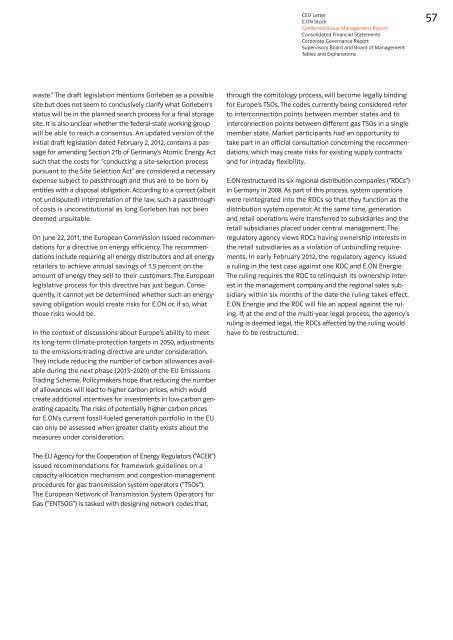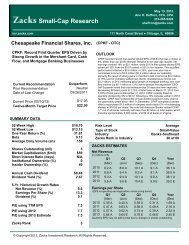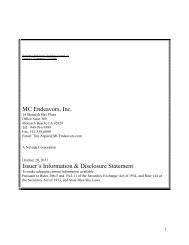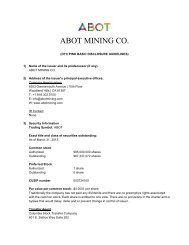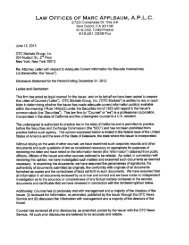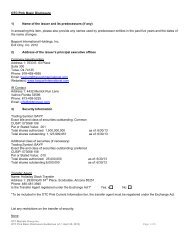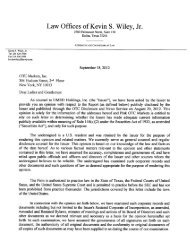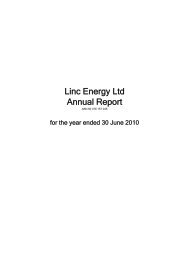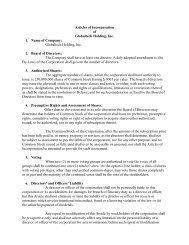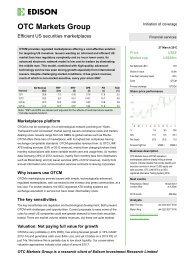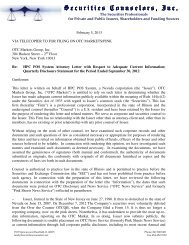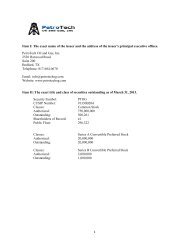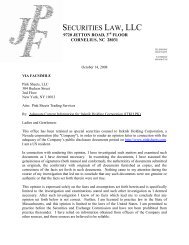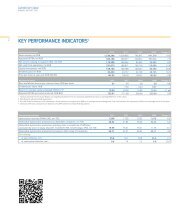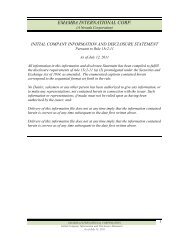2011 Annual Report - OTCIQ.com
2011 Annual Report - OTCIQ.com
2011 Annual Report - OTCIQ.com
Create successful ePaper yourself
Turn your PDF publications into a flip-book with our unique Google optimized e-Paper software.
waste.” The draft legislation mentions Gorleben as a possible<br />
site but does not seem to conclusively clarify what Gorleben’s<br />
status will be in the planned search process for a final storage<br />
site. It is also unclear whether the federal-state working group<br />
will be able to reach a consensus. An updated version of the<br />
initial draft legislation dated February 2, 2012, contains a passage<br />
for amending Section 21b of Germany’s Atomic Energy Act<br />
such that the costs for “conducting a site-selection process<br />
pursuant to the Site Selection Act” are considered a necessary<br />
expense subject to passthrough and thus are to be born by<br />
entities with a disposal obligation. According to a correct (albeit<br />
not undisputed) interpretation of the law, such a passthrough<br />
of costs is unconstitutional as long Gorleben has not been<br />
deemed unsuitable.<br />
On June 22, <strong>2011</strong>, the European Commission issued re<strong>com</strong>mendations<br />
for a directive on energy efficiency. The re<strong>com</strong>mendations<br />
include requiring all energy distributors and all energy<br />
retailers to achieve annual savings of 1.5 percent on the<br />
amount of energy they sell to their customers. The European<br />
legislative process for this directive has just begun. Consequently,<br />
it cannot yet be determined whether such an energysaving<br />
obligation would create risks for E.ON or, if so, what<br />
those risks would be.<br />
In the context of discussions about Europe’s ability to meet<br />
its long-term climate-protection targets in 2050, adjustments<br />
to the emissions-trading directive are under consideration.<br />
They include reducing the number of carbon allowances available<br />
during the next phase (2013–2020) of the EU Emissions<br />
Trading Scheme. Policymakers hope that reducing the number<br />
of allowances will lead to higher carbon prices, which would<br />
create additional incentives for investments in low-carbon generating<br />
capacity. The risks of potentially higher carbon prices<br />
for E.ON’s current fossil-fueled generation portfolio in the EU<br />
can only be assessed when greater clarity exists about the<br />
measures under consideration.<br />
The EU Agency for the Cooperation of Energy Regulators (“ACER”)<br />
issued re<strong>com</strong>mendations for framework guidelines on a<br />
capacity-allocation mechanism and congestion-management<br />
procedures for gas transmission system operators (“TSOs”).<br />
The European Network of Transmission System Operators for<br />
Gas (“ENTSOG”) is tasked with designing network codes that,<br />
CEO Letter<br />
E.ON Stock<br />
Combined Group Management <strong>Report</strong><br />
Consolidated Financial Statements<br />
Corporate Governance <strong>Report</strong><br />
Supervisory Board and Board of Management<br />
Tables and Explanations<br />
through the <strong>com</strong>itology process, will be<strong>com</strong>e legally binding<br />
for Europe’s TSOs. The codes currently being considered refer<br />
to interconnection points between member states and to<br />
interconnection points between different gas TSOs in a single<br />
member state. Market participants had an opportunity to<br />
take part in an official consultation concerning the re<strong>com</strong>mendations,<br />
which may create risks for existing supply contracts<br />
and for intraday flexibility.<br />
E.ON restructured its six regional distribution <strong>com</strong>panies (“RDCs”)<br />
in Germany in 2008. As part of this process, system operations<br />
were reintegrated into the RDCs so that they function as the<br />
distribution system operator. At the same time, generation<br />
and retail operations were transferred to subsidiaries and the<br />
retail subsidiaries placed under central management. The<br />
regulatory agency views RDCs having ownership interests in<br />
the retail subsidiaries as a violation of unbundling requirements.<br />
In early February 2012, the regulatory agency issued<br />
a ruling in the test case against one RDC and E.ON Energie.<br />
The ruling requires the RDC to relinquish its ownership interest<br />
in the management <strong>com</strong>pany and the regional sales subsidiary<br />
within six months of the date the ruling takes effect.<br />
E.ON Energie and the RDC will file an appeal against the ruling.<br />
If, at the end of the multi-year legal process, the agency’s<br />
ruling is deemed legal, the RDCs affected by the ruling would<br />
have to be restructured.<br />
57


